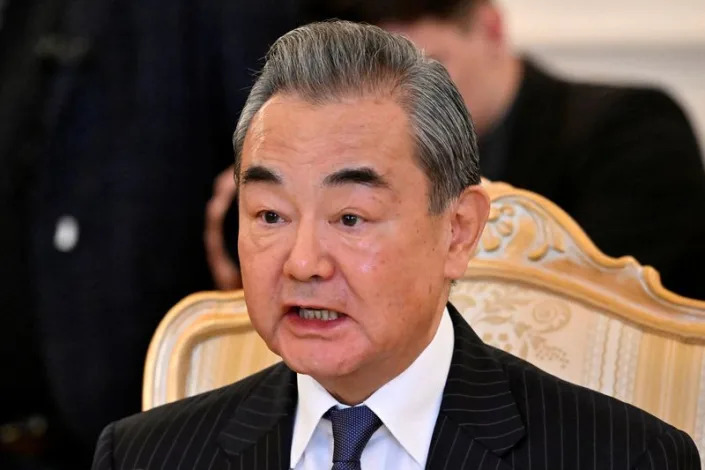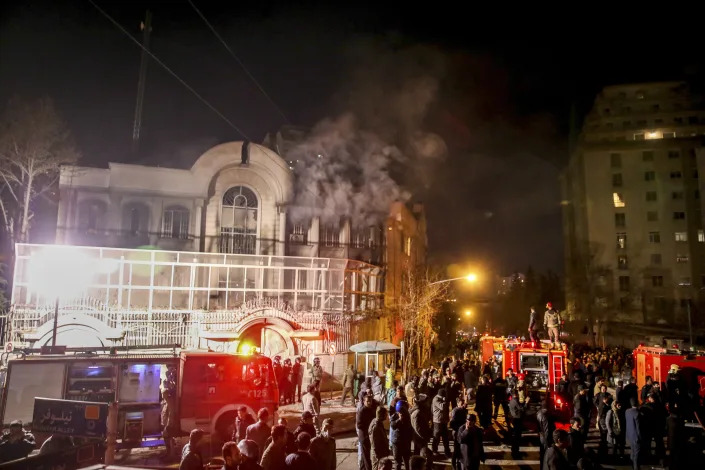BREAKING
Saudi, Iran restoration of ties a 'victory for dialogue'-China’s Wang Yi
China's top diplomat Wang Yi in Moscow
Fri, March 10, 2023
BEIJING (Reuters) - The successful talks between Iran and Saudi Arabia in Beijing are a victory for dialogue and peace, China's top diplomat Wang Yi said on Friday, following the major diplomatic coup for China in Middle East geopolitics.
Iran and Saudi Arabia agreed on Friday to re-establish relations after seven years of hostility which had threatened stability and security in the Gulf and helped fuel conflicts in the Middle East from Yemen to Syria.
"This is a victory for dialogue, a victory for peace, offering major good news at a time of much turbulence in the world," the Chinese foreign ministry cited Wang as saying at the close of the dialogue.
Previously undisclosed talks between the two were held March 6-10 by top security officials from Saudi Arabia and Iran in the Chinese capital, according to a tripartite joint statement of the countries released by China's foreign ministry.
In the statement, the three parties expressed their willingness to make "every effort" to strengthen international and regional peace and security.
The landmark deal is a diplomatic win for China in a region where geopolitics has been dominated by the United States. It also comes as China calls for dialogue over Russia's war in Ukraine, amid accusations from the West that Beijing has not done enough on the issue.
"As a good-faith and reliable mediator, China has faithfully fulfilled its duties as the host," Wang said.
China will continue to play a constructive role in handling hotspot issues in the world and demonstrate its responsibility as a major nation, he said.
"The world is not just limited to the Ukraine issue," said Wang.
(Reporting by Ethan Wang and Ryan Woo; Editing by Hugh Lawson)
Countries that could be impacted by renewed Iran-Saudi ties


In this photo released by the official website of the office of the Iranian Presidency, President Ebrahim Raisi, left, shakes hands with his Chinese counterpart Xi Jinping in an official welcoming ceremony in Beijing, Tuesday, Feb. 14, 2023. Iran and Saudi Arabia have agreed to reestablish diplomatic relations and reopen embassies after years of tensions. The two countries released a joint communique about the deal on Friday, March 10, 2023 with China, which apparently brokered the agreement.


In this photo released by the official website of the office of the Iranian Presidency, President Ebrahim Raisi, left, shakes hands with his Chinese counterpart Xi Jinping in an official welcoming ceremony in Beijing, Tuesday, Feb. 14, 2023. Iran and Saudi Arabia have agreed to reestablish diplomatic relations and reopen embassies after years of tensions. The two countries released a joint communique about the deal on Friday, March 10, 2023 with China, which apparently brokered the agreement.
(Iranian Presidency Office via AP, File)
Fri, March 10, 2023
DUBAI, United Arab Emirates (AP) — A deal between Iran and Saudi Arabia to resume diplomatic ties has wide-reaching effects across the Middle East and beyond, and reduces the chance of armed conflict between regional rivals.
Here’s a look at some of the countries that could be affected by the deal, struck this week in China:
— YEMEN: Both Saudi Arabia and Iran are deeply embroiled in Yemen’s yearslong civil war. Saudi Arabia entered the conflict in 2015, backing the country’s exiled government, while Iran has backed the Houthi rebels who in 2014 seized the capital, Sanaa. Diplomats have been seeking a way to end the conflict, which has spawned one of the world's worst humanitarian disasters and turned into a proxy war between Riyadh and Tehran. The Saudi-Iran deal may provide a boost to efforts to end the conflict.
— LEBANON: Iran long has backed the powerful Lebanese Shiite militia Hezbollah, while Saudi Arabia has backed the country’s Sunni politicians. Easing tensions between Riyadh and Tehran could see the two push for a political reconciliation in Lebanon, which is facing an unprecedented financial meltdown.
— SYRIA: Iran has backed Syria’s President Bashar Assad in his country’s long war, while Saudi Arabia has backed the rebels seeking to topple him. But in recent months, particularly after the earthquake that devastated both Syria and Turkey, Arab nations have moved closer to Assad. The diplomatic deal on Friday could make it more palatable for Riyadh to interact with Assad — and further strengthen the autocrat’s hand.
— ISRAEL: Israeli Prime Minister Benjamin Netanyahu has wanted to normalize relations with Saudi Arabia, but the deal with Iran, his longtime nemesis, will complicate that. It also could make Israel feel more alone if it decides to carry out a military strike against Iran’s nuclear program as it creeps closer to weapons-grade levels. Already, the United Arab Emirates, which has normalized relations with Israel and long has been suspicious of Tehran, already has sought to ease tensions with Iran.
— IRAN: Iran has faced withering international sanctions amid the collapse of its 2015 nuclear deal with world powers. The Saudi-Iran deal could provide Tehran new avenues to skirt sanctions. Already, Iran has deepened its ties to Russia and armed Moscow with bomb-carrying drones in its war on Ukraine.
— SAUDI ARABIA: Saudi Crown Prince Mohammed bin Salman wants to spend tens of billions of dollars on megaprojects to pivot the kingdom off crude oil amid threats imposed by climate change. Worrying about cross-border attacks only puts these projects in more doubt.
— UNITED STATES: The Biden administration insists that it has always been in favor of any arrangement that can help reduce tensions in the Mideast, including a restoration of Iran-Saudi ties. However, U.S. officials say they are skeptical Iran will follow through on its commitments but say they will be watching closely. China's role in mediating the rapprochement may be a concern as it relates to the battle between Washington and Beijing for influence in the region and beyond, but the officials said it was far from clear if the Chinese efforts would be successful.
Fri, March 10, 2023
DUBAI, United Arab Emirates (AP) — A deal between Iran and Saudi Arabia to resume diplomatic ties has wide-reaching effects across the Middle East and beyond, and reduces the chance of armed conflict between regional rivals.
Here’s a look at some of the countries that could be affected by the deal, struck this week in China:
— YEMEN: Both Saudi Arabia and Iran are deeply embroiled in Yemen’s yearslong civil war. Saudi Arabia entered the conflict in 2015, backing the country’s exiled government, while Iran has backed the Houthi rebels who in 2014 seized the capital, Sanaa. Diplomats have been seeking a way to end the conflict, which has spawned one of the world's worst humanitarian disasters and turned into a proxy war between Riyadh and Tehran. The Saudi-Iran deal may provide a boost to efforts to end the conflict.
— LEBANON: Iran long has backed the powerful Lebanese Shiite militia Hezbollah, while Saudi Arabia has backed the country’s Sunni politicians. Easing tensions between Riyadh and Tehran could see the two push for a political reconciliation in Lebanon, which is facing an unprecedented financial meltdown.
— SYRIA: Iran has backed Syria’s President Bashar Assad in his country’s long war, while Saudi Arabia has backed the rebels seeking to topple him. But in recent months, particularly after the earthquake that devastated both Syria and Turkey, Arab nations have moved closer to Assad. The diplomatic deal on Friday could make it more palatable for Riyadh to interact with Assad — and further strengthen the autocrat’s hand.
— ISRAEL: Israeli Prime Minister Benjamin Netanyahu has wanted to normalize relations with Saudi Arabia, but the deal with Iran, his longtime nemesis, will complicate that. It also could make Israel feel more alone if it decides to carry out a military strike against Iran’s nuclear program as it creeps closer to weapons-grade levels. Already, the United Arab Emirates, which has normalized relations with Israel and long has been suspicious of Tehran, already has sought to ease tensions with Iran.
— IRAN: Iran has faced withering international sanctions amid the collapse of its 2015 nuclear deal with world powers. The Saudi-Iran deal could provide Tehran new avenues to skirt sanctions. Already, Iran has deepened its ties to Russia and armed Moscow with bomb-carrying drones in its war on Ukraine.
— SAUDI ARABIA: Saudi Crown Prince Mohammed bin Salman wants to spend tens of billions of dollars on megaprojects to pivot the kingdom off crude oil amid threats imposed by climate change. Worrying about cross-border attacks only puts these projects in more doubt.
— UNITED STATES: The Biden administration insists that it has always been in favor of any arrangement that can help reduce tensions in the Mideast, including a restoration of Iran-Saudi ties. However, U.S. officials say they are skeptical Iran will follow through on its commitments but say they will be watching closely. China's role in mediating the rapprochement may be a concern as it relates to the battle between Washington and Beijing for influence in the region and beyond, but the officials said it was far from clear if the Chinese efforts would be successful.
No comments:
Post a Comment